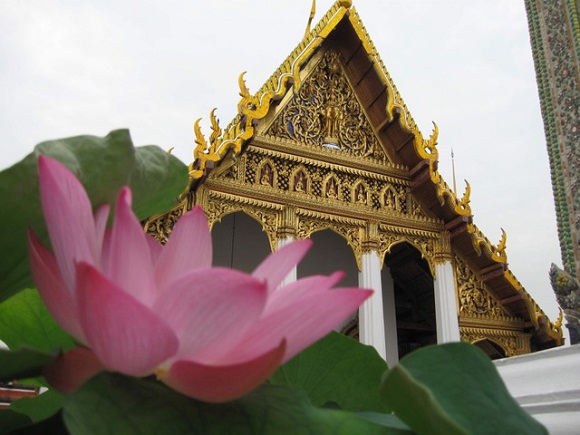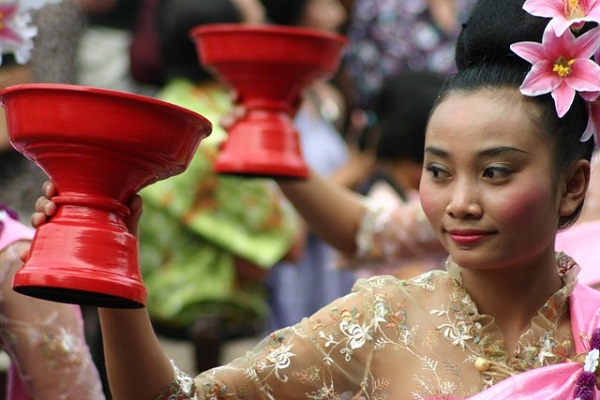| Posted December 29, 2020 | By James Blumenstock | Categorized under Missiology and Theory |

Buddhism is everywhere in Thailand. Temples permeate every city and village. Shrines for appeasing the spirits adorn house yards as well as malls, businesses, and hospitals. The loudspeaker in my neighborhood announces daily the latest temple events and merit-making opportunities. Small Buddhas rest on the dashboards of cars and grace the necks of their drivers. Indeed, Buddhism in Thailand is not merely a personal religious preference or system of values, it is a way of life; a matter of identity. As they say, "To be Thai is to be Buddhist."
With Thai identity so thoroughly intertwined with Buddhism, religious conversion in Thailand evokes nothing less than a clash of worlds. For one, Christianity is considered a foreign religion. Just as everyone "knows" that Thai people are Buddhist, so everyone "knows" that Westerners are Christian. Not only that, but conversion immerses the self in an alternate community, the church, wherein converts find meaning and belonging among "brothers and sisters" of a new, spiritual family. The more time the convert spends with this new family, however, the more his or her biological family feels threatened by this new religion. What all this entails is that when a Thai becomes a Christian, a crisis of social identity ensues. Their newfound faith, while highly valued as their sacred home, is, at the same time, perceived by others as a subversive act of "dis-belonging." The result of all this is marginalization, or the lived experience of being a stranger in one's own familiar land.
Ever since I moved to Thailand in 2008, I've been amazed by how Thai Christians navigate their "strangerness." As a marginalized minority group, Thai believers have discovered creative and, at times, surprising ways for living successfully in a Buddhist society without compromising their faith. In fact, not only are many Christians managing their displacement well, but they are also bolstering their religious identities and boldly testifying to the presence of God's kingdom in the process. How is that possible?
I find this question to be of utmost importance for Christians today, not only in Thailand, but around the world. Throughout most of Asia, Christians have long existed as a minority people. They know what it is like to be misunderstood, estranged, and, at times, persecuted for living against the grain of their home society and culture. In response, they have learned how to maintain their religious exclusivism while, at the same time, holding on to their ethnic, national, and kinship identities. For them, strangerness is a way of life; the everyday background for how they relate to others, understand oneself, and live as a testimony of Jesus Christ.
 What is it like to live as a stranger in a familiar land? What can the Western Church, which is finding itself more and more marginalized within post-Christian societies, learn from Thai believers who have for so long negotiated their Christian minority identities? How might marginalized Christians manage their existing social identities without compromising their faith commitments?
What is it like to live as a stranger in a familiar land? What can the Western Church, which is finding itself more and more marginalized within post-Christian societies, learn from Thai believers who have for so long negotiated their Christian minority identities? How might marginalized Christians manage their existing social identities without compromising their faith commitments?
These questions form the basis for my recent book, Strangers in a Familiar Land: A Phenomenological Study on Marginal Christian Identity. The book presents an insider's perspective on what it is like to live as a minority Christian in a predominately non-Christian society. Through in-depth interviews with Thai believers, I set out to interpret their experiences of marginalization through the lens of phenomenology. In the book, readers are taken on a journey into the everyday world of Thai Christians. They will follow the participants through the joys of religious transformation, the excitement of entering an egalitarian community of saints, the difficulties involved in being displaced from one's family, friends, and society, and the struggles of negotiating religious identity on the one hand, and kinship and cultural identities on the other. The end result is a detailed description of the phenomenon of marginalization that not only reveals the lived experience of Thai believers, but also brings understanding to the lived experience of many believers around the world who are managing daily their minority Christian identities.
In the book, we discover that Christian identity is more than an ideal. It is not something we simply theologize about, teach, or seek to uncover within one's "true self." Instead, Christian identity is lived "out there," in the real world, by everyday Christians who live their embodied existence among those who hold a plurality of competing beliefs, lifestyles, and values. For Thai Christians, being Christian in a Buddhist world is a process. It involves successes and failures, joys and disappointments. However, it is inherently communal as well. The believer is never alone. The Thai church, while small, is a close-knit family that molds the social identities of its members so as to enable them to withstand the pressures of marginalization. We all have much to learn from these precious saints, and I hope my book is able to adequately reveal their stories and experiences so that all Christians, whether from the West or East, may together "attain to the whole measure of the fullness of Christ" (Eph. 4:13) as strangers in familiar lands.
By James Blumenstock
James A. Blumenstock is Dean and Associate Professor of Philosophical Theology at Asia Biblical Theological Seminary in Chiang Mai, Thailand. He can be contacted at [email protected].